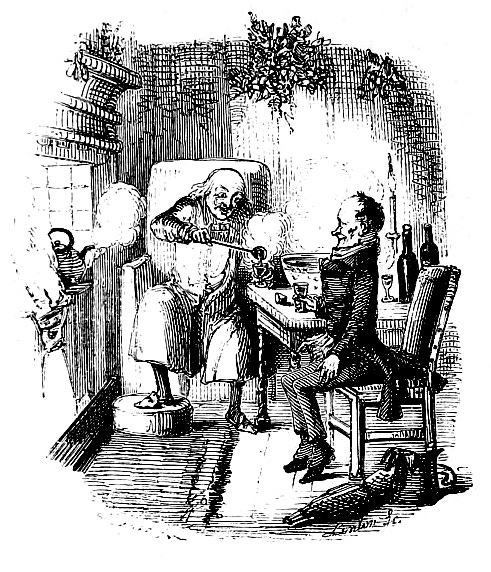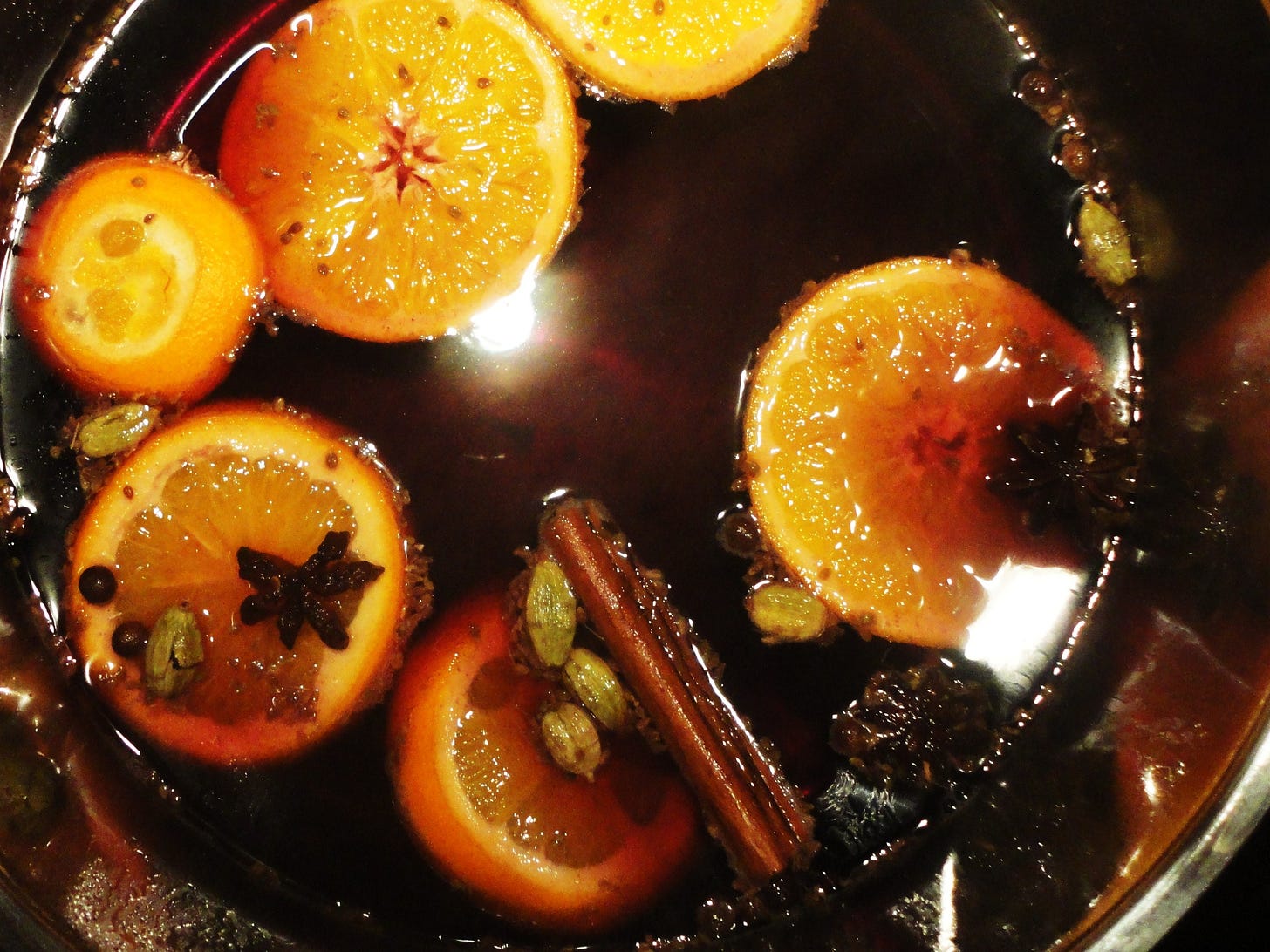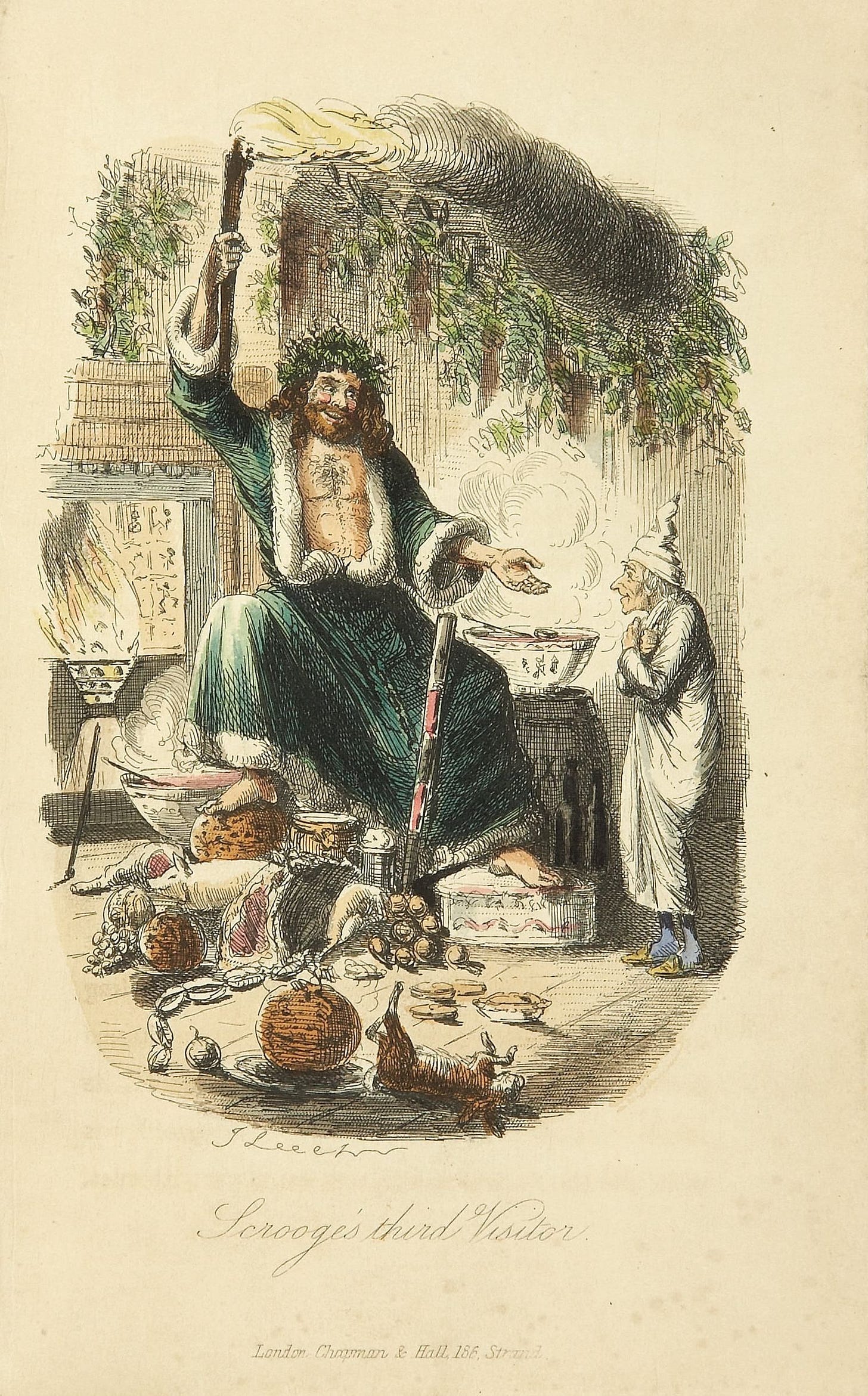Smoking Bishop Recipe
“We will discuss your affairs this very afternoon over a bowl of smoking bishop”
"A Merry Christmas, Bob!" said Scrooge with an earnestness that could not be mistaken, as he clapped him on the back. "A merrier Christmas, Bob, my good fellow, than I have given you for many a year! I'll raise your salary, and endeavour to assist your struggling family, and we will discuss your affairs this very afternoon over a bowl of smoking bishop, Bob!"
- Charles Dickens, A Christmas Carol, 1843.
After Ebenezer Scrooge has the poop scared out of him by the ghosts of Christmas past, present and future on Christmas eve, he surprises the heck out his poorly paid employee Bob Cratchit by giving him a raise and an invite to drink hot alcoholic beverage with him – Smoking Bishop.
Smoking Bishop is a type of mulled wine, punch, or wassail, served hot. The word “smoking” refers to steam rising from the hot drink. It is one variation of hot alcoholic drinks popular in Victorian times known as "ecclesiastics," which refer to Christian/Catholic clerics.

Other ecclesiastics variations include the Smoking Archbishop (made with claret), the Smoking Beadle (made with ginger wine and raisins), the Smoking Cardinal (made with burgundy) and the Smoking Pope (made with Champagne or Rhine wine). Bishops are known for wearing purple robes, cardinals red and the Pope in white, thus using a white wine or sparkling wine is best for a Smoking Pope, rather than claret.
Smoking Bishop is made from port, red wine, lemons or Seville oranges (or regular navel oranges), sugar, and spices such as cloves, cinnamon and allspice. In the original Victorian recipe, the citrus fruit is roasted to caramelize it. The ingredients are then warmed together with the wine and port.
Every holiday season for the past few decades I’ve made my own version of Smoking Bishop, which is closer to a mulled wine or wine-based wassail.
The Icarian’s Smoking Bishop:
Apple cider (spiced is OK)
Apple juice (optional, made be used in addition to or in place of apple cider)
Orange juice (optional, can be used in addition to or in place of whole oranges)
Oranges
Lemons or limes (or both)
Inexpensive port wine (tawny or ruby)
Inexpensive red wine
Allspice
Cinnamon (sticks are best, but powered works too)
Whole cloves
Ginger (fresh or powered to taste)
Brown sugar (1/4 to ½ cup, 31g to 63g)
Notes: Except for the wine and port, I’m not specifying the amount of apple juice and orange liquids. Use an amount that tastes good to you.
Although not mandatory, it’s a good idea to remove the wax from the citrus. If the citrus is shiny it probably has been coated with edible wax. Organic citrus is usually not waxed.
This isn’t necessarily an endorsement of this site, but it has good instructions for a few different ways remove wax from citrus: How to Remove Fruit Wax From Store Bought Citrus https://www.citrusspot.com/how-to-clean-fruit-wax-from-citrus/
Combine apple cider/apple juice, juice of lemon or lime, allspice, cloves and cinnamon to taste in Dutch own of other suitably large cooking pot. Add additional orange juice if desired. Don’t like one or more the spices? Leave them out.
Heat until just boiling, add brown sugar and stir until dissolved, then shut off heat.
Add whole bottle of red wine (750 ml) and about 350 ml of port wine. You don’t need the good stuff in this recipe unless for feel the need. As long as it’s tolerable to drink it’s good enough for this. You can add more or less port to taste. There are no hard and fast rules here.
Cut up whole oranges and lemon and/or lime into slices and float on top.
Reheat until mixture starts to steam, but don’t bring to a boil or you will boil away the alcohol.
For best results, shut off the heat, let mixture cool and store in the refrigerator overnight.
The next day, reheat until just steaming and keep on very low heat. Ladle into mugs to serve. Use a sieve if necessary to strain out whole spices or citrus slices.
This is a drink that keeps on giving. If you don’t finish all of it can go back in the fridge and you can replenish the liquid the following day before reheating.
You can make a non-alcoholic version by subbing cranberry juice for the red wine and port.
You can also bring the wine mixture to a boil and boil off the alcohol if desired.
WARNING! Be wary of the alcohol vapor. Use you vent hood or open a window and keep your head away while the mixture boils. If you inhale the vapor you WILL get a buzz. Alcohol vapor goes straight to head from the lungs. A few minutes of boiling should be enough to eliminate the alcohol and leave the win flavor.
If you wish to duplicate a genuine Victorian hot ecclesiastics drink, try the following recipes.
Eliza Acton published three related recopies, which she referred to as “receipts,” in her 1845 cookbook Modern Cookery for Private Families, pages 580 and 581:
Oxford Punch and Oxford Receipt For Bishop
To Mull Wine (An Excellent French Receipt)
Action’s Oxford Receipt For Bishop:
Note: Seville oranges can be hard to find. Regular oranges are OK.
Make several incisions in the rind of a lemon, stick cloves in these, and roast the lemon by a slow fire. Put small but equal quantities of cinnamon, cloves, mace, and allspice, with a race of ginger, into a saucepan with half a pint of water: let it boil until it is reduced one-half. Boil one bottle of port wine, burn a portion of the spirit out of it by applying a lighted paper to the saucepan; put the roasted lemon and spice into the wine ; stir it up well, and let it stand near the fire ten minutes. Rub a few knobs of sugar on the rind of a lemon, put the sugar into a bowl or jug, with the juice of half a lemon (not roasted), pour the wine into it, grate in some nutmeg, sweeten it to the taste, and serve it up with the lemon and spice floating in it.
Bishop is frequently made with a Seville orange stuck with cloves and slowly roasted, and its flavour "to many tastes is infinitely finer" than that of the lemon
Note: Acton’s recipe is rather elaborate. You probably won’t be roasting your citrus next to an open fire. If you chose to follow it to the letter, be very careful when burning off the alcohol in the port, both to avoid the flame getting out of control and inhaling the alcohol vapor.
Merry Christmas. Bless us one and all.
Further reading:
Cedric Dickens (1983), Drinking with Dickens, Elevendon Press, p. 54, ISBN 9780882548791
Andrea Broomfield (2007), Food and Cooking in Victorian England, Greenwood, p. 154, ISBN 9780275987084
Jane Struthers (2012), "A Glass of Bishop", The Book of Christmas, Random House, p. 175, ISBN 9781448148936






